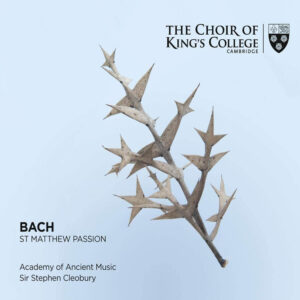From the pedestrian opening chorus with its questionably delightful mix of all-over-the-place choristers, this Matthew Passion is utterly non-competitive and of interest really only to the proud parents and relatives of the little performers. The pitch ambiguities and tempo of said opening chorus and the muffled sound might make you think you accidentally grabbed a recording by Günther Ramin (Thomanerchor, 1950s) from your shelves and they cast all that is to come in a mediocre light.
Generally, the chorales are executed better than the choruses and the choristers’ performance appears to get better as the work proceeds. But right off the bat, the question/answer play between Chorus I and II is ignored except for a left/right channel flicker that sounds as if it had been introduced in post-production. Ultimately more damning: There is no discernible interpretive or theological line to be found, except for the laudable attempt to simply make the music sound good–something in which the team around Stephen Cleobury and the usually fabulous Academy of Ancient Music succeed somewhat, but not wholly.
The singers are, by and large, contributing to the dispiriting so-so-ness. Countertenor David Allsopp is not particularly convincing–not outright bad, either, but with a hint of the witch from Humperdinck’s Hänsel & Gretel. The ever-reliable Matthew Rose is a lumbering Jesus with modest German and a mouth full of marbles. “Trinket alle daraus” may serve as an exemplar of the inflexible, somewhat coarse approach. Mark La Brocq’s tenor is wobbly and otherwise unmemorable (“O Schmerz”, indeed, abetted by one of the several lesser moments on the chorus’ part).
Still, not all is modest. Namely veteran James Gilchrist, whose excellent German and subtly dramatic interpretation continue to make him a top-notch Evangelist, on par with the best of currently active Evangelists like Mark Padmore, Werner Güra, or Daniel Johannsen. And then there is bass William Gaunt, whose “Am Abend da es kühle war” (arguably Bach’s finest recitative?) and following aria (“Mach dich, mein Herz, rein”) are simply exquisite, as good as any on disc. He delivers it with just the right mix of a lyrical, natural, and gentle approach and melts your heart instantly.
As great as it is to find such a gem in this recording, it hardly suffices to lift the whole venture. As widely a recorded work as the Matthew Passion is not as good as its best parts but as bad as its weakest moments. The only unique selling point would be the reliance on trebles. But the modern standards for that have been set much higher by the Thomaner Chorus in either of their most recent recordings under Riccardo Chailly (Decca) or Thomaskantor Georg Christoph Biller (Rondeau). So unless you are one of the aforementioned parental units, skip this one in favor of either of the Thomaner’s efforts or one of the other reference recordings listed below.
































